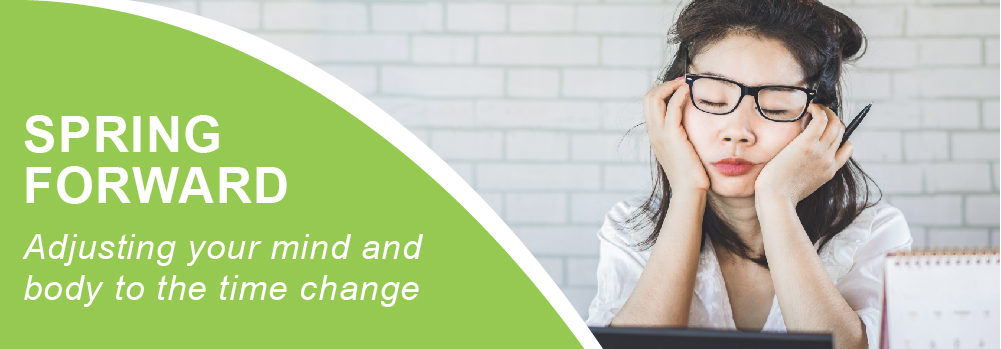
Adjusting your mind and body to the time change
This weekend, we will all adjust our clocks and spring forward, but chances are, no one will be springing anywhere for a few days. Losing an hour of sleep can really throw off your sleep cycle leaving you groggy, tired and most likely running late. Plus, the darker morning tricks your body into thinking it’s not actually time to wake up. Luckily, it only takes a day or two to adjust your internal clock to the new schedule. Although short, those couple days can be rough, so we pulled together some quick tips to get through daylight savings.
Clear your mornings.
The Monday after springing forward can be brutal. Maybe Tuesday, too. It’s no small task to get up and going on an hour less sleep, and there’s a pretty good chance you’ll be running late. If possible, block your morning schedule, so you can ease into the day rather than rushing through the morning. If working from home is an option, this would be a great day to do it.
Eat to sleep.
Avoid foods and beverages that interfere with your sleep. About four to six hours before bedtime say no to sugar, alcohol and caffeine.
Go into the light!
Light suppresses the secretion of sleep-inducing melatonin. Exposing yourself to sunlight will help with the adjustment to the time change. Open the blinds and curtains! Let the natural light in!
Conversely, when it’s time for sleep, do not expose yourself to light. If you get up at night to go to the bathroom, use a nightlight rather than turning on the lights.
Turn-off when you turn-in.
Help your body adjust to the time change, by getting good sleep. Get your mind and body ready to snooze by turning your devices off. Laying in bed on your phone or tablet stimulates your body and brain. Read a book instead, take a warm bath, listen to calming music, pick-up an eye mask – whatever you find helpful in falling to sleep.
Take your hour back.
Allow yourself some extra time leading up to the time change and try to go to bed early to make up for the hour you are about to lose. Making-up for the lost time, ahead of time, can help your body transition into daylight savings.
If you are frequently sleepy and think it may be more than an adjustment to the time change, make an appointment to talk with your primary care physician.
Originally Posted March 2020
